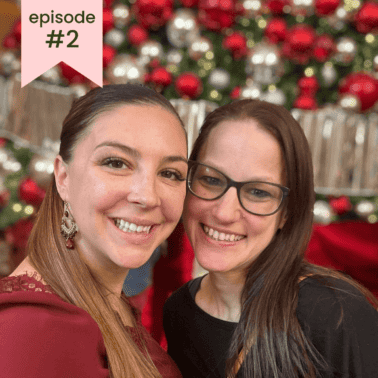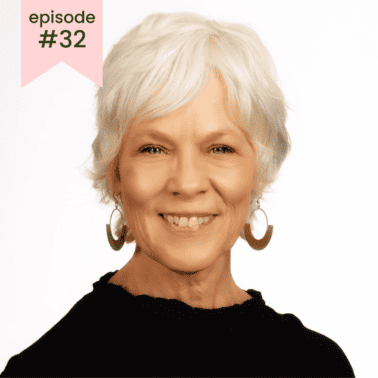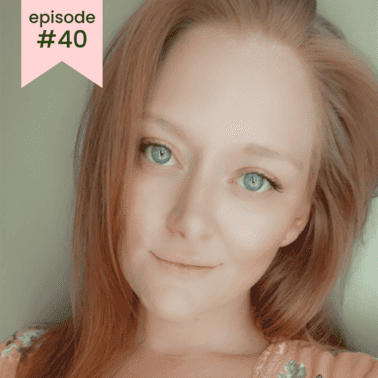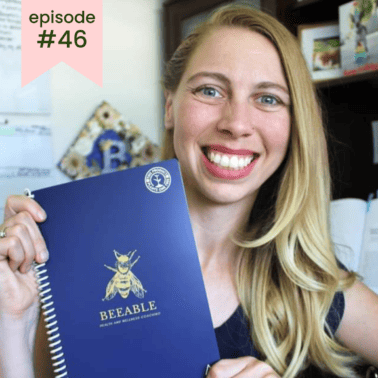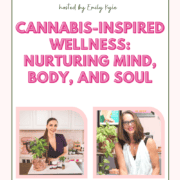Welcome to this episode, where you will meet the inspiring Kimberly Malone, a wellness warrior who’s harnessing the power of cannabis to nurture her mind, body, and soul. Explore Kimberly’s uplifting story about living a life of sobriety, wellness, and happiness without chronic pain.
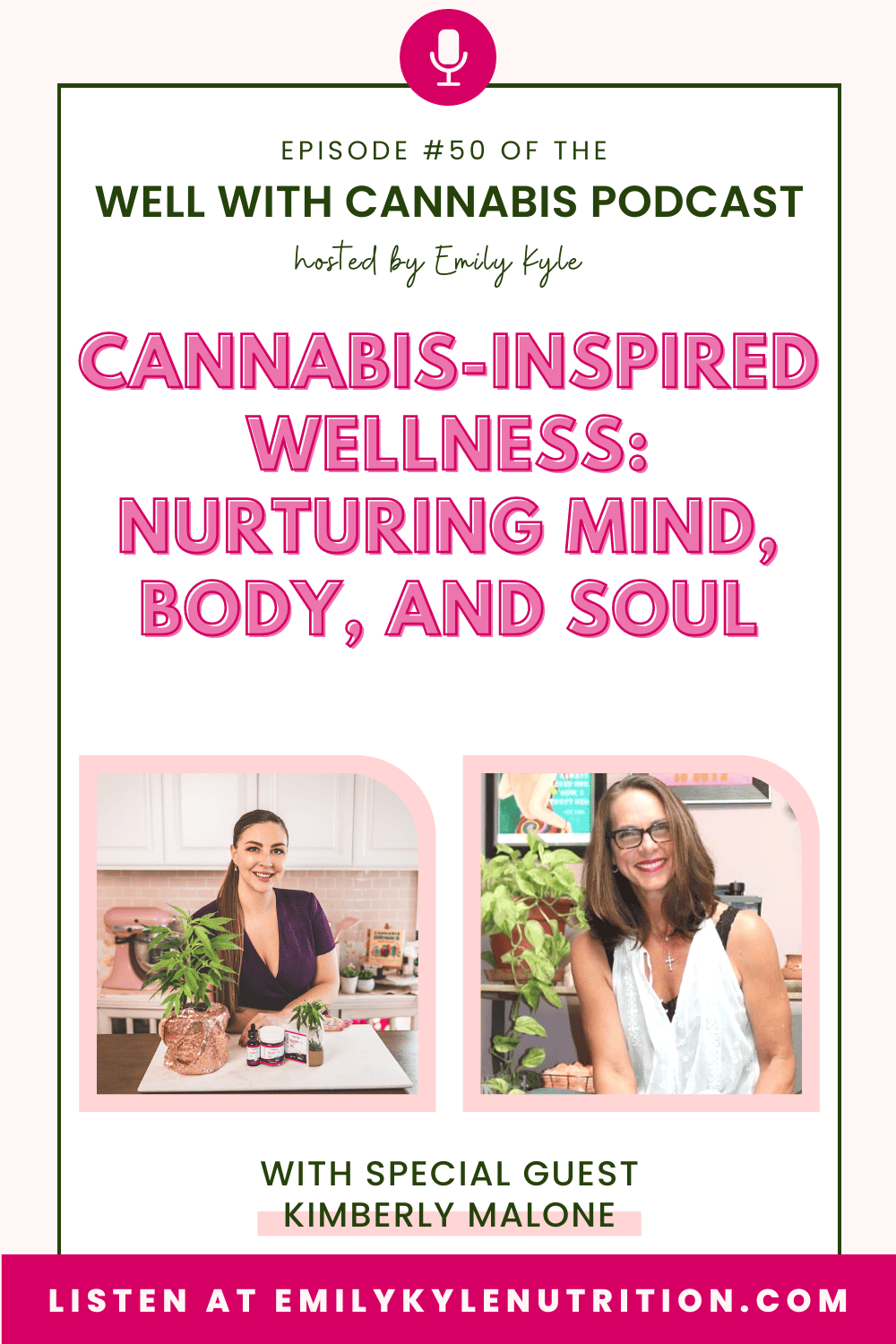
Table of Contents
Features
- Release Date: Monday, September 18, 2023
- Episode Number: Season 1, Episode 50
- Special Guest: Kimberly Malone
Listen To The Episode
Click the play button above to listen to the episode.
Listen to all podcast episodes →
Why You Will Love This Episode
Meet Kimberly Malone, a 54-year-old wellness warrior from Texas who embodies the spirit of resilience and positivity. Kimberly is an active grandmother, a loving wife, an avid gardener, and a dedicated volunteer.
She leads a vibrant life filled with love, adventure, and travel with her husband. Kimberly’s journey into the world of cannabis began when she started researching CBD for treating brain trauma, seizures, PTSD, and pain.
Her curiosity led her to uncover the astonishing benefits of this plant, and she has been using it ever since to manage chronic pain resulting from old injuries and arthritis.
Living with psoriatic arthritis, osteoarthritis, and nerve pain, Kimberly found in cannabis a natural remedy that truly works. As a recovering alcoholic who refuses to take pain medication, she offers a unique perspective on the power of alternative wellness solutions.
Despite being diagnosed with bipolar disorder in her twenties, Kimberly continues to live a life filled with joy, underpinned by her strong commitment to wellness.
Kimberly shares her inspiring journey, providing invaluable insights into how cannabis has transformed her life. She discusses her experiences with CBD, its benefits, and how it can be incorporated into a wellness routine.
This episode is a must-listen for anyone seeking to understand more about the potential of cannabis for enhancing wellness and quality of life.
Full Transcript
Kimberly: I saw miracles with cannabis. I think that until you see that true miracle happen, you don’t realize that this stuff works from the inside out.
Announcer: Welcome to the Well With Cannabis Podcast, a show dedicated to telling the life-changing stories of those who live well with cannabis all while teaching you how to do the same. Meet your host, Emily Kyle, a registered dietitian nutritionist turned certified holistic cannabis practitioner. Emily changed her life for the better with the help of the cannabis plant, and now she’s committed to helping others do the same.
Tune in each week to hear heartwarming stories and gain the knowledge you need to feel connected, inspired, and supported on your own cannabis journey. Whether you’re a new cannabis consumer or a lifetime lover, you’ll benefit from these uplifting tales of real-life journeys that will show you how you, too, can live your best life well with cannabis.
Disclaimer: Hi there. Before we jump into today’s episode, I wanted to share a note on potentially sensitive content. The episodes on the Well With Cannabis Podcast are created for adult audiences only. We will, at times, cover sensitive topics, including but not limited to suicide, abuse, mental illness, sex, drugs, alcohol, psychedelics, and the obvious use of plant medicine. Explicit language may be used occasionally. Please refrain from watching or listening to the show if you’re likely to be offended or adversely impacted by any of these topics.
The information on this show is for informational and educational purposes only. It does not constitute medical advice. If any of the content on this podcast has brought up anything for you, please reach out or speak to a professional or someone you trust.
Emily: Hello, and welcome back to another episode of the Well with Cannabis Podcast. I’m so excited to be here with our friend, Kimberly Malone from Texas. She has an amazing story. She’s a self-described avid gardener and wellness warrior. I’m so excited to talk to you, Kimberly. Welcome!
Kimberly: Thank you very much. So excited to be here.
Emily: Thank you so much. Now, you have been using cannabis for all sorts of things, and I really am interested in hearing your story and how you got to cannabis in the first place.
Kimberly: I’ve been a recovering alcoholic for over 25 years. A family member of mine started using cannabis after an accident and wanted me to look into it a little bit. I was a health and wellness coach then, and she wanted my opinion and feedback.
Kimberly: At that time, I was living in what I call the “sober mind”. I wasn’t using alternative medicine because I had had such a problem in the past. It’s a huge stigma I’ve had to overcome. As I was learning for this family member, I was completely overwhelmed by all the benefits that could be found in plants.
Kimberly: That was about eight years ago, and I finally started using cannabis for myself in the last five years. I’ve used it for a variety of things. It helped ground me a little to help my mother at the end of her life. I’ve also had pain from past injuries and arthritis. I’m absolutely against narcotics, so I found that using cannabis to help with the pain also helped me stay grounded and get over the stigma.
Emily: That’s an amazing story. Thank you so much for sharing that with us, and congratulations on your sobriety. If you’re willing to talk about that a little bit, I would love to discuss how you navigated that. There are many people in the sober living community who are conflicted about where cannabis can fit into their lifestyle. Would you mind talking a little bit about how you worked through that and how it felt for you?
Kimberly: I don’t mind discussing it at all, actually. I think it’s very interesting because I have some other friends who are also sober who use it and are secretive as well. But it’s really a place where you’re comfortable in your sobriety, and I am absolutely against narcotics.
Kimberly: For me, it was a way to relieve chronic pain. It also helps me mentally. I was a horrible alcoholic. I started drinking very young and had my first blackout in eighth grade. I was in a terrible car accident when I was 23, so I leaned heavily on narcotics for five years on top of my out-of-control drinking. I was diagnosed with bipolar disorder at 28 years old, along with alcoholism. It took me about 15 years of being sober to get to a place where I was comfortable being around others who drank. It took me a while to understand that even though I have a problem, it doesn’t necessarily mean they have one. Some people are okay with controlling their drinking.
Kimberly: I started my wellness journey in 2016 by going back to school in New York at the Institute of Integrative Nutrition. That opened up a whole world for me. Finding that additional balance in my forties really helped me be able to open up at the end of my forties and now into my fifties.
Emily: That is amazing. Thank you so much for sharing that with us. Hopefully, for other people who are questioning whether or not cannabis can fit into their sober lifestyle, hearing that it really can in a positive and wellness-focused way is amazing. I hope it helps other people, so thank you for sharing that with us.
Kimberly: Sure, but I want to add another thing: I wasn’t looking for a high in cannabis. I was looking for how it made my body feel. I lean toward CBD because it controls the pain without making me feel stimulated. I find that a higher CBD-to-THC ratio works best for me. Everybody has to find what works best for them. I’m not looking to get high; I’m looking for relief. That’s a window that I think a sober person has to be very careful about looking into and evaluating for themselves.
Emily: I’m so glad you said that. You can still use cannabis responsibly to feel good; it does not have to involve getting high if you don’t want to. You have so much control over how you use it, and so many options out there won’t get you high. That means everybody can at least try it to see if it’s right for them.
Kimberly: I struggled with the stigma of bipolar disorder, alcoholism, and a pain pill problem, and I lived a very quiet life for a long time. But that was ridiculous. Over the last couple of years, I’ve been able to help some friends who had cancer by making oils and blending CBD and THC, which was very beneficial for them.
Emily: Oh, my gosh, that is amazing. I’m so glad you really thought about it and went for it because now you’re also helping other people. So many of us in the community have to turn around and help others because we’ve been so positively impacted that we want to share that with others.
Kimberly: That is true. Very true. And you’re a parent, and then you become a grandparent, and then you worry about stigma and how the grandkids are being raised. But you can also do it in a quiet manner in front of some and an open manner in front of others. And that’s what I choose to do with the little ones.
Emily: I think that’s perfect. Many people really struggle with how to discuss it with their family. You don’t have to discuss it if you don’t want to, but if you do want to, there are ways to have responsible conversations. We don’t always go around advertising what medications we’re taking, so people don’t have to go around and advertise that they’re consuming cannabis as medicine if they don’t want to.
Kimberly: That is very true. And I’m so glad you have a community out there where you are educating us and helping us to learn more about it and use it responsibly. I think that has helped greatly, and the availability of it on your website.
Emily: Oh, thank you so much. Now, let’s shift off the stigma and turn it into wellness. I’m interested in your perspective as a wellness coach. Do you find that cannabis helps your overall health and wellness? I ask because there is the stigma that cannabis consumers are lazy, eat junk food, and sit on the couch all day. The more people I talk to, the more I hear that cannabis is part of their healthy lifestyle. It helps them eat, exercise, and sleep better. I’m interested to hear how cannabis has helped your health and how you fit that in with health coaching.
Kimberly: Thank you. I started using myself right around the age of 50, and I’m in better health now than I was. My cholesterol is lower. My blood pressure is regulated. I love to exercise. I don’t sit around and eat. I use it for a little boost. It helps me in the morning whether I put some in my coffee or eat a protein bite for breakfast. It helps me get my morning started and work out according to my routine.
Kimberly: It has helped me control my arthritis. I have to be careful when looking at the strains or products I purchase because I don’t use Indica due to high blood pressure. I think a person really has to educate themselves and figure out what is best for them. What works for me may not work for you or another person. The more you learn, the more excited you are about your wellness journey.
Kimberly: I think that many of us women spend our 20s through 40s raising children and pursuing a career and other goals. Once we get close to 50, we realize that we need to take care of ourselves and our health again. When we’re not healthy and functioning well, it’s a domino effect for the rest of our family.
Kimberly: As I mentioned earlier, I started using it around the time my mom’s health got bad, during the last six years of her life. I had already lost my brother, father, and both grandmothers. I’d been a part-time caretaker for about 15 years, had continued my career and education, and raised a daughter who was at college. I became extremely overwhelmed at the end-of-life process for my mother, and it helped me balance. It helped me get out and go for walks, relieved my stress, and gave me comfort from arthritis pain. It helped my mood and my body.
Kimberly: My doctors actually noticed that my body fat was lower, and I told them that I used cannabis instead of pain medicine. There were times when my pain levels had risen enough that they were affecting my central nervous system, and I had to go back on pain medications, which was upsetting. I was having cold spells and spasms. You must look at your health and be wise about what to modify and when. I won’t ever go back to drinking because that was a very dark hole in a very ugly time that I don’t ever want to revisit, but I’ve struggled with using short-term narcotics.
Kimberly: Cannabis helps me control my daily pain. I use it twice a day in edible form. You have to educate yourself. I like to follow brain doctors because brain health is important to me. And some say to use cannabis, some say not to, and some of them are teetering on the fence. I think it is an individual choice.
Emily: You are full of so much wisdom. I am soaking up everything you are saying. How did the conversation with your doctors go? You’re in Texas. A lot of people are very scared to discuss this with their medical providers. What did that look like for you?
Kimberly: several doctors wanted to send me to pain management for narcotics to control my arthritis. I told them I don’t take pain meds and use cannabis. Some were on board; some would chuckle and mention that our neighboring states already have medical cannabis and that we’re so limited. Texas is limited to cancer and seizures, but I think that needs to open up a bit. I figured that at 53 years old, it was ridiculous to hide my cannabis use from my doctors. I don’t hide; I’m an open book. That is part of my sobriety.
Emily: That’s amazing. If you can have that experience in Texas, I feel like that can give people a little boost of confidence to have that conversation with their doctors. I think we always think it will be worse than it can be. Most doctors, even if they are against it, are not going to scream at you and kick you out of the room. They’ll say they’re not into it, and you can find a new doctor if you want to. It’s so freeing not to have to hide anything, and it’s such a great feeling.
Kimberly: It is such a great feeling. I was worried about how my neurologist and rheumatologist would respond, but they just shrugged and told me it was my choice. Don’t be afraid of your choices, as long as they’re healthy and in moderation. You need to educate yourself constantly. Sign up for webinars, find good resources, and don’t just follow social media trends. Take in the wealth of educational resources that exist and apply them to find what works best for you.
Emily: Well said. Let’s say there’s a 50-year-old woman listening who has never used cannabis before. What advice would you give her for her first time giving it a try?
Kimberly: It depends on what you’re using it for. That needs to be the first question you ask yourself. What do you want to change in your life? What are you using it for? Then educate yourself around that, and don’t be afraid to try. Get quality products, not from the gas station that sells Kratom and other things that I believe are bad for a person. I’ve called up a friend of mine and recommended your store to a friend in Florida because you ship to all 50 states. Make sure you’re ordering quality products from legitimate sites and not putting yourself at risk.
Kimberly: Start small. I had a family member who had a terrible accident and was having seizures. I was amazed at how she used cannabis to get over the middle of a seizure when we were there. She had a family friend who was an MD there; his eyes were huge. He couldn’t believe how quickly she recovered. It was at a funeral that we were able to leave and go to a family dinner afterward. She walked around like nothing had ever happened. I saw miracles with cannabis. I think you don’t really realize that cannabis truly works from the inside out until you see a miracle like that happen.
Emily: Did she use it during a seizure? During
Kimberly: During a seizure. That was when it clicked for me that it really worked. Then I really got into the research of where to buy it online. I bought gummies and tinctures from Charlotte’s Web and Bluebird Botanicals and became a true believer.
Emily: To see that in front of your own eyes has to be truly a miracle. That’s amazing.
Kimberly: It was amazing, especially being a person of recovery. I grew up in the era of anti-drug presidents when we were raised to believe that drugs were bad. You look back at what people were doing at Woodstock, and you can see that it’s happening all over again, and I think people are doing it with wisdom now.
Emily: I’m so glad. It’s finally time. When we talk about recovery, they’re always saying that cannabis is a gateway drug, but other people are saying that it’s an exit drug. What is your opinion on that?
Kimberly: I would have to side with the exit drug. It could be a gateway drug for some people, so I don’t want to offend somebody that has an issue. I don’t feel that it’s a gateway drug when used responsibly and in the right ways. I need a dose that is effective enough without a buzz. I feel chill and relaxed like a world of weight has been lifted off my shoulders. That’s what I look for in cannabis, and I think everybody needs to evaluate what they’re looking for.
Kimberly: I can use corn tortilla chips as an example because that’s usually what people like to snack on here in Texas. I don’t do well with corn, though. As a dietitian, you know that just like with people who have gluten intolerances and cannot eat gluten, corn can affect some people. It’s the same with cannabis. It’s a personal decision about what works for you.
Emily: That’s so perfectly said, and it can also be a parallel to your diet. We’re all making choices on what’s best for our bodies. Cannabis is the same way with food. We can make good choices and bad choices. Education makes you capable of making good choices for yourself and ultimately being your own healer. It gives you the power to take full control of your health and wellness.
Kimberly: That is true. I just got into herbalism, and looking back through history, I’ve found that many cultures have medicine people. I’ve studied Don Miguel Ruiz and HeatherAsh Amara, started dabbling in wellness as a whole, and looking at it from all sides. They used medicine from all different cultures.
Kimberly: As we record, it’s Black History Month, and there were medicine women in those cultures in the 1800s and early 1900s. Their recipes have been passed down throughout their families. I think we need to take a step back and look at where we came from. It’s from plants, and it’s from our earth. We can be well if we ground ourselves again and connect again with the earth. I think if we do that as a process, as a whole. It just makes our lives a lot more balanced.
Emily: Oh, I couldn’t agree more, and I find myself more and more interested in herbalism and other plants because seeing that cannabis is so magical makes me wonder what other plants can do. It really becomes this passion, if you will, of these gifts given to us on this earth that we have the ability to explore and enjoy, and it becomes this whole different mindset of what is possible for health and wellness. Our current healthcare system is so far from where we need to be, but I think that having these conversations and making it known that plant medicine is normal is really important moving forward.
Kimberly: I agree with you because I think people of your generation are going back to farming. You’ve got your farm there, and you’re raising vegetables for your family as well as the cannabis for your industry. But I think that generation is finally plugging back into what my great-grandparents and grandparents were doing: using the earth as our medicine. I think education is where wisdom comes in.
Kimberly: I’ve had some people look down on me. I worked in health care for ten years and was in the ER recently. They asked if I wanted pain medicine, and I told them that I use cannabis and got “the look”. She was about my age, and I just thought to myself about how judgmental that was. I had to take a step back and consider that she may not be educated. We need to continue to fill our minds with wisdom and let go of what other people think and how they might judge us. It’s important to unlearn the stigma that has been implanted in us.
Emily: That’s so important. There is such freedom on the other side, whether you come out of the closet publicly or tell yourself that you are a cannabis consumer. Once you don’t care what people think anymore, you don’t care what people think anymore. It gives your mind so much more space to care about things that are actually important and stop worrying about what society might say.
Kimberly: It is important. You can carry that bubble around with you, but you don’t have to. So much weight is gone when you do. As you said, freedom is just a weight lifted off your shoulders, and then you can evolve into the person you were meant to be or are trying to become. I think we shift every decade or so. We go through a period in our 20s and make some changes in our 30s; we have our ups and downs. We can’t get wrapped up and ignore the growth process. By the time we’ve grown and evolved into our mid-life era, you have all the freedom that you didn’t have in your 20s. Learn that freedom younger.
Emily: That is such good advice. What does the future look like for you with cannabis in your life?
Kimberly: I think I want to continue learning more. I’ve really gotten into cooking with cannabis, making tea, and doing some other fun things. I’ve done the tinctures and topicals, but I’m ready to continue exploring. Your calculator has been really helpful because I was making products and had no idea how much was in them. I was doing it by feeling. I want to continue to expand, explore, and gain wisdom. Education and evolution are fun for me.
Emily: It is so fun. It turns into all these different hobbies, whether you’re growing it or making things at home; it can become a really enjoyable part of a lot of people’s lifestyles and become a hobby that fulfills your time in a way that feels good.
Kimberly: It does feel good. I have recently started teaching others on a very small scale, and only my inner circle is interested in learning more about cannabis. I’ve had them over here with me to learn how to make butter.
Emily: Oh, that’s fun.
Kimberly: One of my arms has been injured for about six weeks, so I need help making my butter and other things. I have a very small inner circle that is open to cannabis as well, so I’ve been teaching them how to make the products. That’s always fun for me. I was able to teach my wellness classes online during COVID, but I had done some seminars here and there where we made an essential oil or something to put in your diffuser. I had taken some chef classes and always loved to cook, so I wanted to teach healthy meal prep and all those types of things. I think all of this being interwoven is going to be fun in the future.
Kimberly: I took a step back from health coaching after my mother passed because I had estate issues to deal with for a couple of years and then took some time off. But I think the doors are open. I am just interested in seeing where it goes. I’ve been telling my friend in New York for two years that we need to do a podcast. That would be so much fun. And then you got knocked off social media, making me shake my head. I’m like, “Yes, it’s coming.” So it’s coming. I need people.
Emily: I’m so excited for you in the future. That is the future. I feel like we need more educators who are educated on incorporating cannabis into health and wellness and showing other people how. I did an interview recently with my friend Janice. She was talking about how the prohibition of cannabis took out a generational ability to teach where grandmothers would teach their daughters. Women would come together, and they could learn about cannabis. That had gone away, but now we’re seeing people return to it. What you said about getting together with your girlfriends earlier reminded me so much of how we can now share our wisdom, and hopefully, they can share it with future generations after us, and it feels really good to come back to that.
Kimberly: It really does, as does being able to experiment with different things, like making gummies. I tend to choose healthier things to make when I’m cooking with cannabis. I could make cannabis brownies all day long and eat them and find that I’m ten pounds heavier, but that doesn’t work for me. Choosing what does work for me and my body, making them into a healthy cannabis product that I can enjoy consuming, and knowing that it’s good for me has been fun. I’m curious to see where this will go.
Kimberly: I would love to learn more about herbalism. I’ve looked at a couple of courses, and I thought about flying out to Eugene, Oregon, to a company that I use oils and spices from. I thought that would be fine. I have some books and stuff from Rosemary Gladstar.
Kimberly: I think you’re right; a podcast is the way to go. Nowadays, it’s so easy for people to pop in an earbud or turn on the podcast in their car and go. I love the hands-on and social aspect of being able to get together with friends. Friendship is different as you age because your focus is often elsewhere, and you may lose some friends or pick up new friends. I moved in the last couple of 3 years, and I have a neighbor who’s become my workout partner, and she is a blast.
Kimberly: I think you pick up new people, still have your old people, and put that whole group together. I put a group together last for a birthday party for a girlfriend of mine, and we invited around ten friends. I’ve had friends for up to 40 years who had never met each other. We pulled the new neighbor into my core group of friends and had a super great time. I think the sharing aspect is important in the circles of friends, and being open to being able to do things is fun and important.
Emily: I love that circle of friends. Actually, so many women have talked about how their first experience with cannabis was because of a circle of friends. It really seems like it’s women getting together, sharing their knowledge, and expanding that education out there, and I think that’s so special. I would love to come to one of those events. I want more of that in the world. Every woman should get together with their friends and enjoy cannabis use.
Kimberly: House of Puff up there where you are would be a place for fun women-based business people for you to get with your RD background, with them and their openness out there. And it’s a base. I think that would be a fun collaboration. I’d love to see up there and do something.
Emily: It’s so fun. I’m excited. There are events popping up like a Puff and Paint, the painting workshop where you can smoke instead of drink. And it’s really fun to see those events popping up. But I’d love to see you leading some events and bringing women together. It’s so exciting what the future holds for cannabis because there are so many opportunities out there.
Kimberly: It is. I have really thought about the legislative part, talking to the Texas legislator about expanding legislation. I just haven’t taken a step in that direction yet because the last few years haven’t allowed me to do that. I continue to ponder that because we need to open our doors more in Texas. We have too much coming across our border that is not good for people to be dabbling in. I think it’s more important for us to get out there and get the legislation passed so we can be using cannabis from legal resources that we know are healthy and coming from good growers.
Emily: Yeah. Which everybody deserves. Everybody deserves access to medicine that will help them in a really positive way. Texas is so difficult. I really hope that moves forward for you in the future. Now, I want to be respectful of your time, but I also want to ask you the same four questions I ask all of my guests. Are you ready?
Kimberly: I’m ready. I’ve got my notes here.
Emily: Awesome. The first one coming up. What are you most proud of?
Kimberly: I think as I’ve aged, especially after I turned 50, I have found more love and not just love for others. I’m a big lover of people, but I’ve also had to find true love for myself through self-discovery, peeling back the layers to get to the root cause of my emotions or irritation. With that love comes gratitude and grace. That part is still unfolding, even five years later.
Kimberly: I’ve reached deep for some good teachers. I’ve studied HeatherAsh Amara, Don Miguel Ruiz, and Sarah Blondin is one of my favorites. I read her book on love from within, and she had meditations. Love and forgiveness and all the things that come from self-love.
Emily: That is so beautiful. What do you think your life would look like without cannabis?
Kimberly: Actually, I think I’d be in a whole heck of a lot of pain, and I would have aggravation. I don’t think I would have gotten through some of the panic attacks I was having when my mom was in her last several years. I knew it before the doctors told us. She had been battling health issues and was trying to hold it together for everybody else. I don’t think I would have relapsed into alcohol use, but I think that I could have been a dark or grouchy couch potato, and that’s not healthy either.
Emily: Oh, I’m so glad you found cannabis. If you could go back 10, 20, or 30 years ago and give yourself a piece of advice, what would it be?
Kimberly: My childhood was amazing. I had wonderful parents. We traveled a lot. We had a lot of fun and everything that we did. I had an aunt, uncle, and cousins who lived in Europe, so we were able to travel back and forth to visit. I started beating myself up a lot in my teens and then dabbling into drugs like most teens do. I started drinking a little bit and getting in with some of the wrong crowds. I wasn’t one for college, but I went to college and played and dropped out, played some more, and went into a really bad spiral with my life.
Kimberly: So I think in your 20s, It’s very important for a person to realize that you choose your path. Our parents have a path for us and want the education piece, but we also have to choose our paths. I ended up doing my education later. I made it a goal to graduate from college before my daughter graduated from high school, and I started going back to school in my thirties and was able to do all that. While I think it’s important to explore life and attain some goals, it’s also important to not beat yourself up and learn. There are management skills that are missing for people in their 20s. Of course, you’re an adult and want to live on your own, but there are management tools that have to be learned.
Kimberly: I have things broken down on things that I would give tips for. I don’t know if you have time for all of those.
Emily: I love it. Please, yes.
Kimberly: Okay. For my 20-year-old self, I think my advice would be to stop comparing myself to others so much because I did a lot of that. I think you need to remember that we are all on a different path, and we can all still attain things as we get older, but we don’t have to follow the norm. Remember that your family is there to support you, even when you disappoint them. They’re there to celebrate the good things that will come to you. Family is vital to me, and I believe that we can expand that family into our inner group of friends.
Kimberly: Keep your chin up because life is a heartache. As women, I think we go through significant changes every decade. I don’t even think we know who we want to become until we’re in our thirties. We think we might know who we want to become, but something about our thirties changes. At that point, you’re really an adult, and you really sink into your responsibilities. It’s a lifelong journey, and there is no final stage to attain to sit comfortably for the rest of your life.
Kimberly: We get into our forties and fifties and have many different paths that we could take. Open and expand your mind, and do not be afraid. At least try something new every year. Read a new book, listen to some podcasts, or take a class or webinar. Don’t be afraid to learn and expand.
Kimberly: I grew up in sales and did marketing, public relations, and business development for years. My family had a car dealership, so I grew up with PR and customer service. All of a sudden, I realized that I loved wellness and fitness and needed to start learning something that resonated with me so that I could apply it to my own life. We can be truly educated and not truly apply it.
Kimberly: I’ve spent the last three years applying the education that I’ve received from several different resources to my life and journaling about it. You can think about things all you want, but you need to put pen to paper so that you have a tracking mechanism. It opens another level of inner discovery, which leads to self-love. I think that it is so important that we truly love who we are. If you don’t like who you are, you can change. Don’t be afraid to try cannabis and find out if it’s for you or not.
Emily: Oh, my gosh, I’m soaking up all your wisdom. I love it so much.
Kimberly: I think about finding your inner child, too. We forget about that fun childhood playfulness that many of us have when we go off to college and aren’t under our parents’ roof. You have to find that again as you age into your forties and fifties, and it’s a fun journey.
Kimberly: Go hiking, be active, be outdoors. Do you resonate with the water? Do you resonate with the forest in the mountains? What feeds your soul? Let yourself dive into that at least once every year and step away from work. I have friends who still stay with me when they travel through Texas to see family. I tell them to put their laptop down and unplug after 8:00. Many of us get into workaholism, and that’s not good for us mentally, physically, or emotionally. You have to learn to shut the door and separate work from your home and family life. When you work seven days a week, you don’t have the downtime needed to refuel your souls.
Kimberly: Find what does that for you and do it as often as you need. Fill it up. You can find it again if you lose your smile and joy. That even applies to physical fitness in your forties and fifties. Even though some people roll their eyes, walking, Tai Chi, yoga, whatever moves your joints is so important. When you lose your flexibility, you can’t do much anymore, and that’s not fun. Being inside isn’t fun. We need to be outdoors.
Emily: Like I said, I can listen to your wisdom all day. Everything you’re saying is spot on, and I am so thankful you’re sharing this with us. But I’m going to get to our very last question. Are you ready?
Kimberly: Yes.
Emily: Very last one. If you could be remembered for one thing in the cannabis space, what would it be?
Kimberly: Trust your journey. Trust it. I want to be remembered for sharing with others. The way I share is by telling people that it may not be right for them, or it might be right for them. I don’t push it on other people; I let them come to me with it. But I think I want to be remembered for the wealth of education, the love, and being open about it.
Emily: You gave us all of that and more today. I can’t thank you enough for coming here, sharing your story, sharing your wisdom, and just sharing that general love for life. I feel so energized talking to you, and I’m so glad that you found cannabis and that you shared your journey here with us today. Thank you so much.
Kimberly: Thank you so much for having me. This has been so much fun. My husband came in this morning and had to take a picture of me because I’m back on the computer working again.
Emily: I am so glad you came here to do this, and I’m excited to see what you do and you should be teaching some classes.
Kimberly: Thank you. Thank you so much. That may be where I end up, and we’ll have to see. The future we’ll see.
Announcer: Congratulations, you’ve finished another episode of the Well With Cannabis Podcast and are one step closer to discovering how you, too, can live well with cannabis.
Thank you for listening in today. We hope this episode has been a helpful and informative one. Please visit emilykylenutrition.com for more information on today’s show, show notes, guest information, recipes, and other resources.
If you want more support and encouragement on your cannabis journey, please consider joining the private Well With Cannabis Community. In this group, you can connect with like-minded individuals focused on improving their health and wellness through cannabis.
Join the group today to continue your journey of wellness together!
Related Episodes
Podcast Episodes
Conquering Sjögren Syndrome with Cannabis
Podcast Episodes

